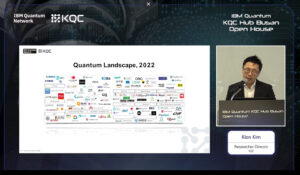APAC Quantum
In the western hemisphere, North America and EMEA are strongholds for quantum innovation. In the Asia-Pacific region (APAC), the obvious choice is China; yet Japan, Singapore, Australia, and South Korea are doing some serious research as well.
South Korea is an interesting one, with several programs on quantum research at the university level, as well as a few startups like EYL and Qunova Computing trying to develop the technology for the commercial market, according to TQI’s Quantum Intelligence platform.
Expanding on this, Kion Kim — a Researcher Director at Korea Quantum Computing Corp (KQC) — spoke at the IBM KQC Hub Busan Open House on its Roadmap.
KQC
Based in Busan, KQC is the first commercial Quantum Computing solution provider working with IBM Quantum research. KQC’s main focus is on performing practical research projects, building the QC ecosystem and providing access to QC. KQC will be a leading company in KQC industry ensuring the quantum-readiness of the major companies in South Korea in near future.

“From market research, we realize that we [South Korea] are some steps behind those top-tier countries in the quantum computing world,” said Kim to open his presentation.
The fact confirmed, Kim stated it was time to take action to move forward.
Kim then quoted TQI:
“According to The Quantum Insider, they have more than 600 quantum computing companies in their database as of 2022…”
The Busan-based researcher then talked about the general ecosystem, again using TQI high-quality data as a benchmark, going into some detail about the hardware, software and end-user ecosystem before focusing on South Korea.

“Quantum Wave”
“They [South Korea] have a vision of moving from digital to quantum era,” Kim began. “Part of the strategy is they will train 1000 quantum experts by 2030. I think this is a very good start to build a human pipeline to create a sustainable quantum ecosystem, but it’s not sufficient, though.”
Kim is aware that building the ecosystem from the ground up is an important first step in gaining an advantage in the region and said KQC will play an important role in what he calls the “quantum wave,” with education, research and business the three key pillars of that success.
Government Actions
South Korea’s Vice Minister for Science, Technology and Innovation, Joo Young-Chang, however, recently said Korea lacked an industrial ecosystem in the quantum computing sector, which widens its technological gap with the other advanced economies,” according to an excellent article by Jin-Won Kim in The Korea Economic Daily.
In April 2021, the South Korean government introduced its investment strategy for quantum technology research and development, allocating 49 billion won ($37.6 million) toward its R&D budget. Whether that’s enough remains to be seen.
It looks like Busan could become what Waterloo is to Canada, an exciting quantum hub where the technology of tomorrow will be developed.
We will have to see. But whatever the outcome, South Korea will be competing with the rest in the region at some point.
If you found this article to be informative, you can explore more current quantum news here, exclusives, interviews, and podcasts.
Feature image: Image by Markus Winkler from Pixabay
















